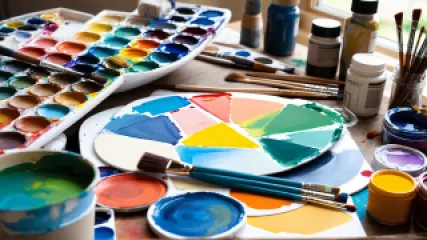Exploring Art Therapy: An Interview with a Professional
Exploring Art Therapy: An Interview with a Professional
Welcome to this special interview feature where we delve into the world of art therapy and its power to heal. Today, we have the privilege of speaking with Zariah Hill, a renowned art therapist with years of experience in helping individuals find solace and relief through artistic expression. Join us as we explore the transformative potential of art as a coping mechanism and discover the profound impact it can have on mental health and well-being.
Understanding Art Therapy
Art therapy is a form of therapeutic practice that harnesses the creative process to improve mental, emotional, and physical well-being. Through various art modalities such as painting, drawing, sculpting, and collage-making, individuals can explore their inner selves, express their emotions, and gain insights into their experiences.
Zariah explains, "Art therapy provides a safe and non-judgmental space for individuals to communicate and process their thoughts and feelings. It goes beyond words, allowing individuals to tap into their subconscious and access deeper levels of self-awareness."
The therapeutic benefits of art are not limited to those with artistic skills or training. Zariah emphasizes, "You don't need to be an artist to benefit from art therapy. It's not about creating a masterpiece; it's about the process of creation and self-expression."
Art as a Coping Mechanism
Art has long been recognized as a powerful tool for self-expression and emotional release. When faced with adversity or emotional turmoil, engaging in art can provide a much-needed outlet for processing difficult emotions.
"Art serves as a healthy coping mechanism," Zariah shares. "It allows individuals to externalize their internal struggles and transform them into something tangible. This act of creation can provide a sense of control and empowerment over their emotions."
Art as a coping mechanism is particularly effective for individuals who find it challenging to express themselves verbally. Zariah explains, "Some people may struggle to put their emotions into words, but through art, they can communicate and make sense of their experiences in a visual and symbolic way."
The Therapeutic Power of Art for Anxiety Relief
Anxiety is a common mental health concern that affects millions of people worldwide. Art therapy offers a unique approach to managing anxiety by providing a calming and soothing outlet for self-expression.
"Creating art engages the mind in a focused and meditative state," Zariah explains. "This state of flow helps individuals shift their attention away from anxious thoughts and immerse themselves in the present moment."
The process of creating art also activates the relaxation response in the body, reducing stress levels and promoting a sense of calm. Zariah adds, "Engaging in art can be a form of mindfulness practice, allowing individuals to cultivate inner peace and find respite from the overwhelming grip of anxiety."
Art as Therapy: Unlocking Self-Discovery
Art therapy goes beyond mere creative expression; it can also serve as a tool for self-discovery and personal growth. Through the act of creating art, individuals can uncover hidden emotions, gain insights into their inner world, and foster a deeper understanding of themselves.
"Art acts as a mirror," Zariah reveals. "When individuals engage in the artistic process, they often discover aspects of themselves that were previously unknown or unacknowledged. It allows for introspection and self-reflection, leading to personal transformation."
Furthermore, the artwork created during therapy sessions serves as a visual record of an individual's journey, capturing their progress and milestones along the way. Zariah highlights, "Looking back at these creations can be incredibly empowering, reminding individuals of their resilience and growth."
Art Therapy: A Holistic Approach to Healing
Art therapy is a holistic approach to healing that addresses the interconnectedness of the mind, body, and spirit. It recognizes that art has the power to engage the senses, evoke emotions, and foster a sense of meaning and purpose in life.
"In art therapy, we consider the artwork itself as a form of communication," Zariah explains. "It provides valuable insights into an individual's internal landscape and can guide the therapeutic process."
The therapeutic relationship between the art therapist and the client is also of paramount importance. Zariah emphasizes, "Trust, empathy, and unconditional positive regard are essential elements in creating a safe and supportive environment for healing to occur."
Conclusion
Art therapy is a profound and transformative modality that harnesses the power of art for healing and self-discovery. Through artistic expression, individuals can find solace, relief, and a deeper understanding of themselves. Whether it's as a coping mechanism, anxiety relief, or a means of unlocking self-discovery, art therapy offers a unique and holistic approach to mental health and well-being.
As we conclude this interview with Zariah Hill, let us reflect on the words of Vincent van Gogh, who famously said, "I dream my painting and then I paint my dream." In art therapy, individuals have the opportunity to do just that – to dream, create, and paint their way towards healing and wholeness.






